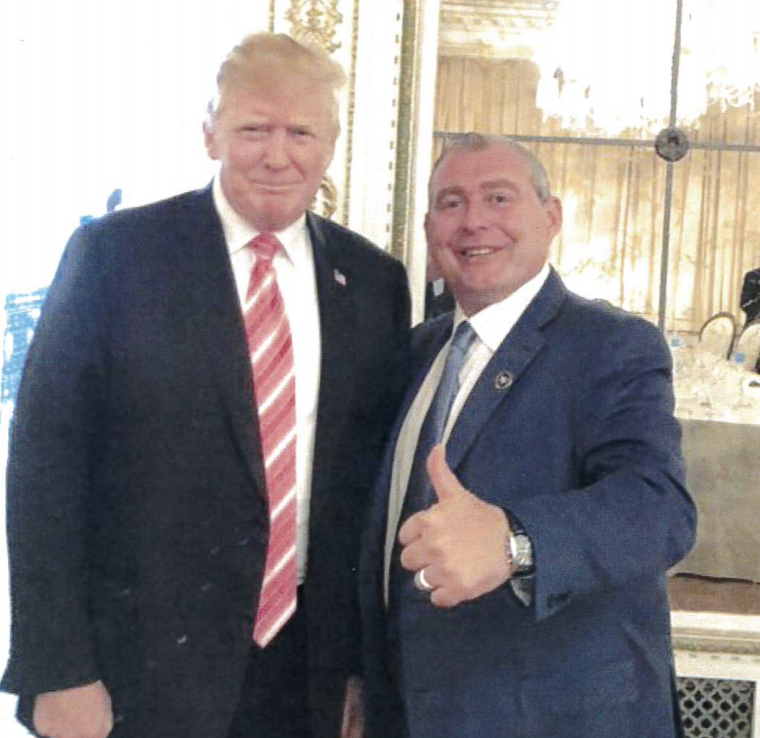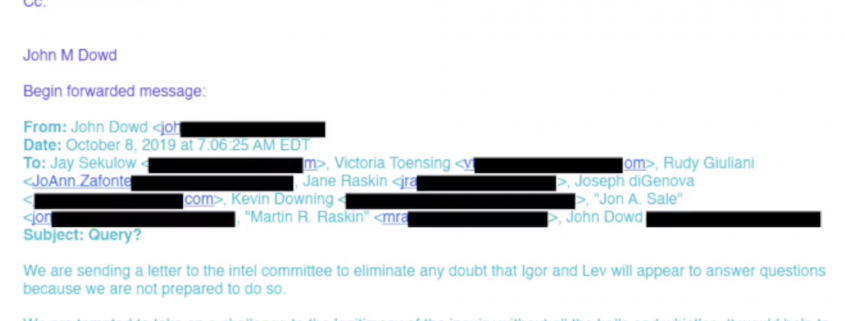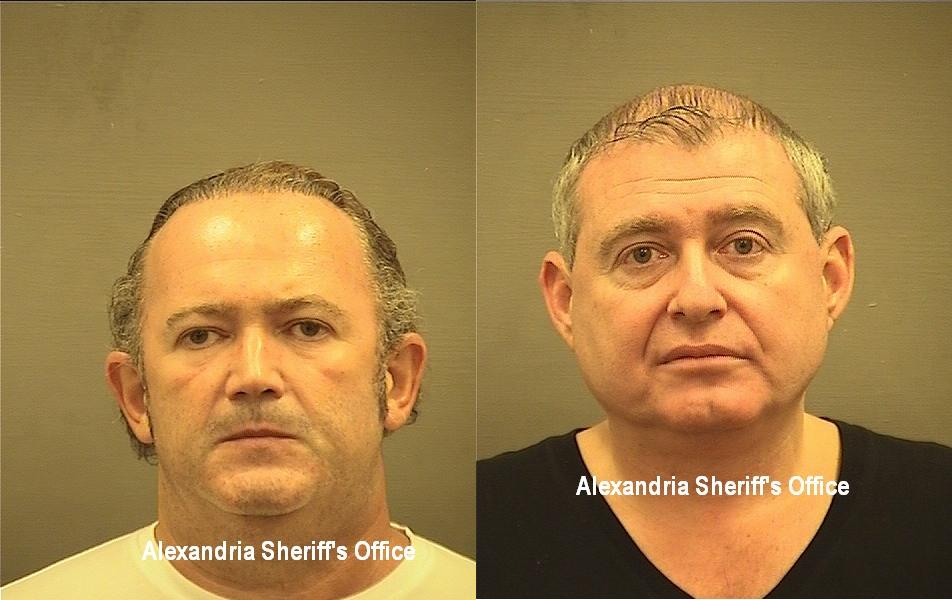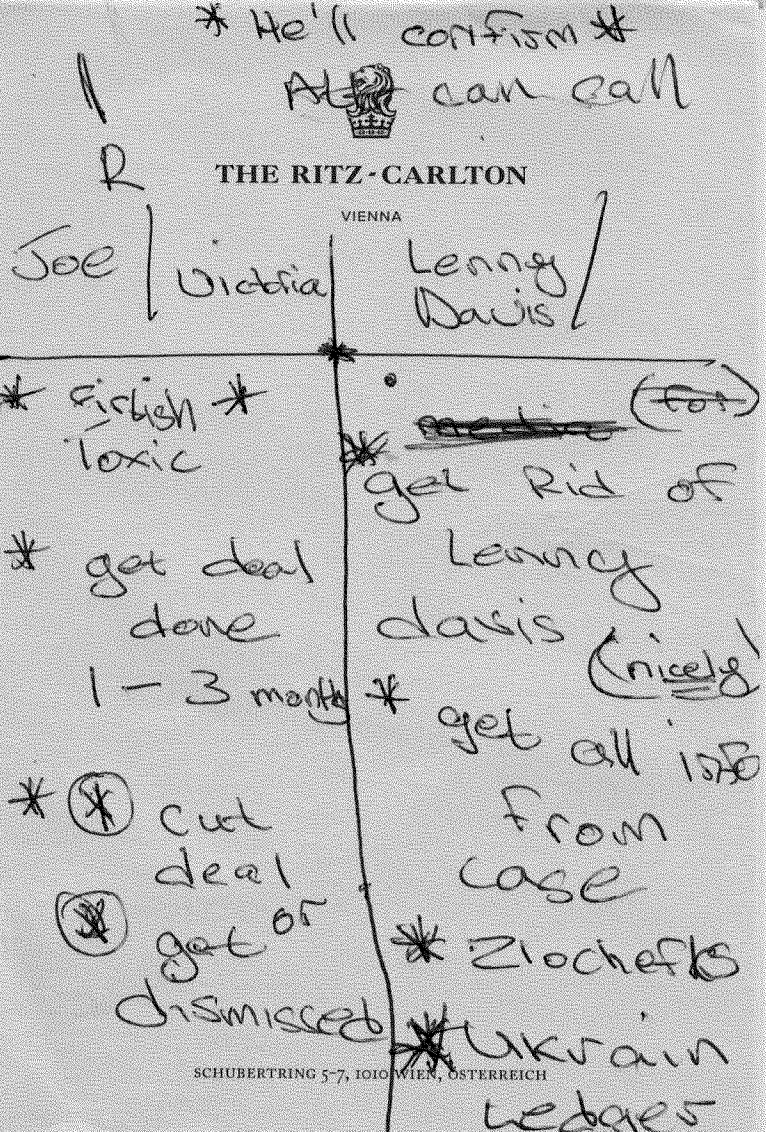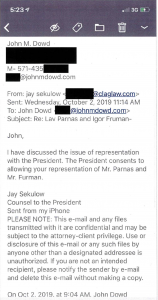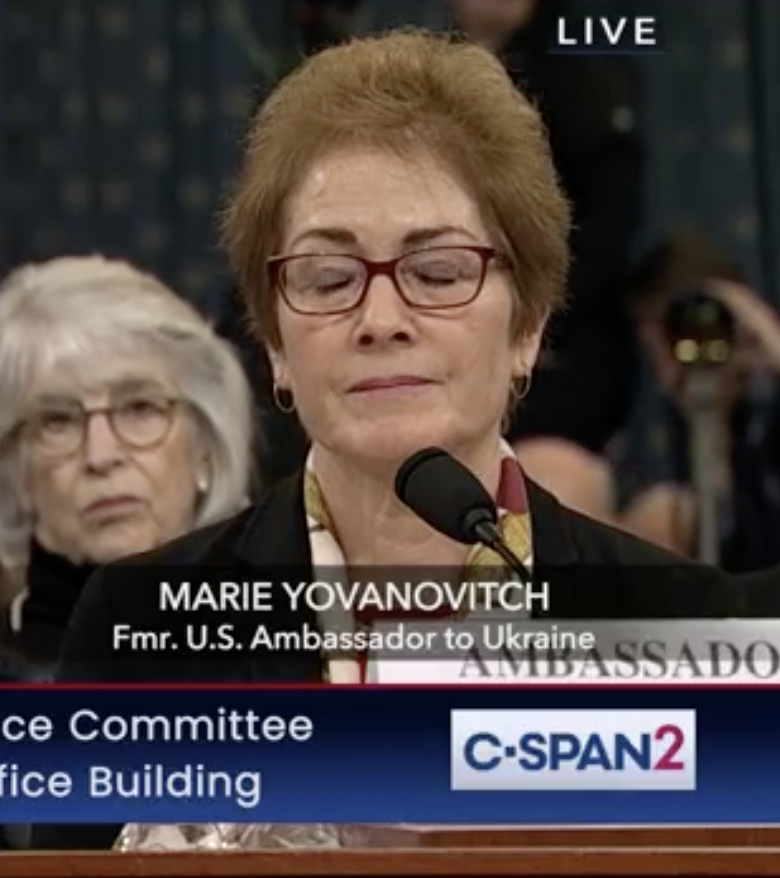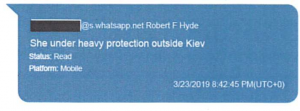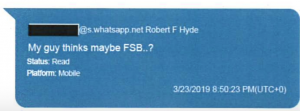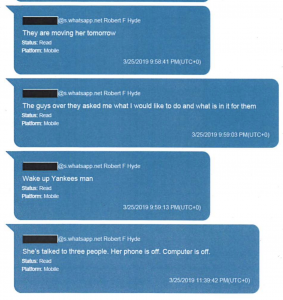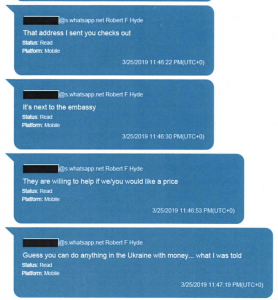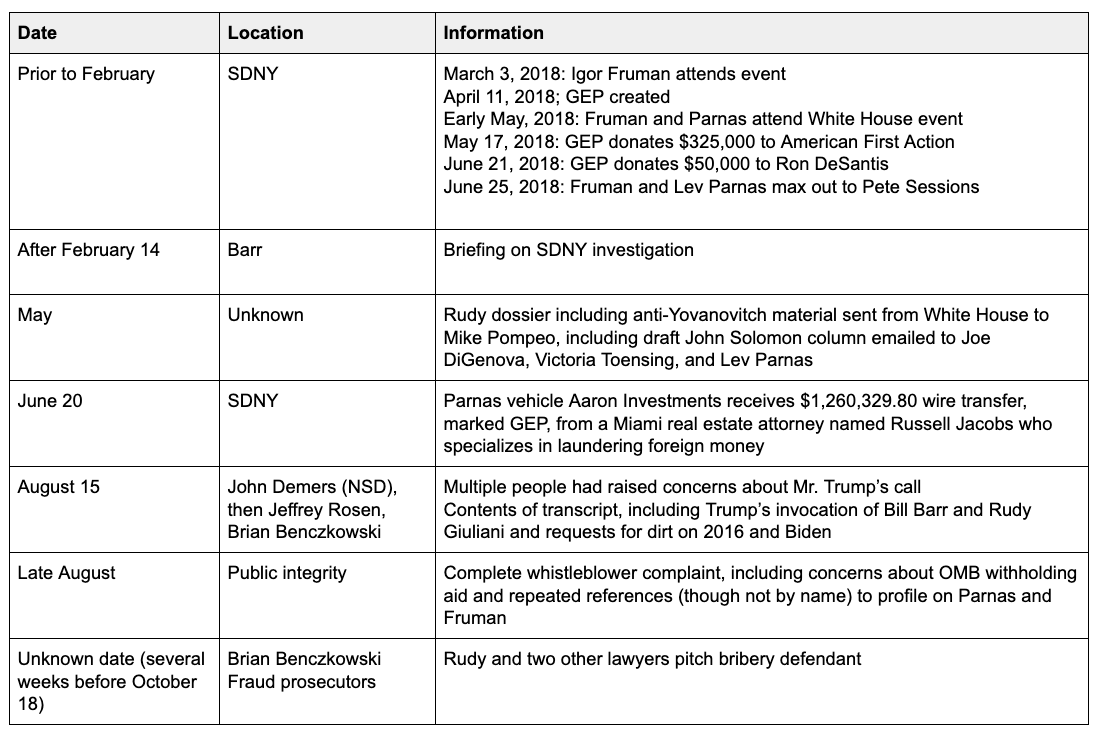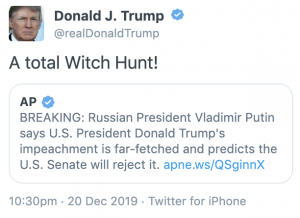As Accused Co-Conpirators, Donald Trump and Lev Parnas Should Be Treated with Same Skepticism
WaPo has a long profile of Lev Parnas that adopts the same approach with the accused influence-peddler that virtually the entire press corps does: raising cautions about his veracity because Parnas is has been indicted in a serious crime, with more charges promised.
Some of his most explosive claims that Trump, Vice President Pence and Attorney General William P. Barr knew of his activities remain unsubstantiated and disputed. The president’s allies say his assertions are not credible, noting the serious criminal charges he faces.
“These allegations are being made by a man who is currently out on bail for federal crimes and is desperate to reduce his exposure to prison,” White House press secretary Stephanie Grisham said this past week.
[snip]
And some Democrats have counseled caution in the face of his allegations, noting that he is accused of serious felonies.
“Parnas is someone whose evidence, whose testimony should be questioned, challenged, like any other witness,” Sen. Edward J. Markey (D-Mass.) told CNN, adding, “but he should be a witness.”
Prosecutors have hinted in court that more of Parnas’s activities have not come to light yet. This past month, they revealed that he received a mysterious $1 million loan in September from a lawyer for Dmytro Firtash, a Ukrainian gas tycoon facing bribery charges in the United States. In court, Bondy said the loan was made to Parnas’s wife and had been intended to help the couple buy a home. He said that Firtash had cut all ties to Parnas after it started to become clear Parnas intended to assist the impeachment probe. He and Parnas have declined to comment further.
The profile mentions Trump’s impeachment in the third paragraph, and describes the way Parnas’ media blitz undermines Trump’s defenses. But it treats Trump’s defenses, having been accused of high crimes and misdemeanors, as presumptively trustworthy.
The House of Representatives formally voted to send the Senate charges that Trump abused his office by pressuring Ukraine to help his reelection bid.
[snip]
Still, the blizzard of new details in the documents Parnas had turned over raised a host of questions about Trump’s efforts in Ukraine — ratcheting up the pressure on Senate Republicans to allow witnessesto be called during the coming trial.
[snip]
The materials sharply undercut the notion pushed by the president’s supporters that the activities in Ukraine were about U.S. anti-corruption policy — rather than defeating Biden.
The profile doesn’t make two things clear. First, Trump is an accused defendant every bit as much as Lev Parnas is, with the same incentive to lie. More importantly, from the very beginning of this impeachment process, Parnas has been described as a co-conspirator of Trump’s in his crimes.
The whistleblower complaint that first accused Trump of multiple crimes invokes Parnas and Igor Fruman at least four times. After describing Rudy’s trip to Madrid to meet with Andriy Yermak in the wake of the Trump-Zelensky phone call, the complaint notes that Rudy has reached out to other Zelensky advisors through the grifters.
Separately, multiple U.S. officials told me that Mr. Giuliani had reportedly privately reached out to a variety of other Zelenskyy advisers, including Chief of Staff Andriy Bohdan and Acting Chairman of the Security Service of Ukraine Ivan Bakanov.4
4 In a report published by the Organized Crime and Corruption Reporting Project (OCCRP) on 22 July, two associates of Mr. Giuliani reportedly traveled to Kyiv in May 2019 and met with Mr. Bakanov and another close Zelenskyy adviser, Mr. Serhiy Shefir.
Then, when raising Yuriy Lutsenko’s confessed efforts to invent dirt targeting Marie Yovanovitch, the whistleblower raises Rudy’s public claims that John Durham was meeting with Ukrainians for his Bill Barr-led probe.
Mr. Lutsenko also stated that he wished to communicate directly with Attorney General Barr on these matters.9
9 In May, Attorney General Barr announced he was initiating a probe into the “origins” of the Russia investigation. According to the above-referenced OCCRP report (22 July), two associates of Mr. Giuliani claimed to be working with Ukrainian officials to uncover information that would become part of this inquiry. In an interview with Fox News on 8 August, Mr. Giuliani claimed that Mr. John Durham, whom Attorney General Barr designated to lead this probe, was “spending a lot of time in Europe” because he was “investigating Ukraine.” I do not know the extent to which, if at all, Mr. Giuliani is directly coordinating his efforts on Ukraine with Attorney General Barr or Mr. Durham.
The complaint provides further details laying out Rudy’s meetings with Lutsenko.
It was also publicly reported that Mr. Giuliani had met on at least two occasions with Mr. Lutsenko: once in New York in late January and again in Warsaw in mid-February. In addition, it was publicly reported that Mr. Giuliani had spoken in late 2018 to former Prosecutor General Shokin, in a Skype call arranged by two associates of Mr. Giuliani.10
10 See, for example, the above-referenced articles in Bloomberg (16 May) and OCCRP (22 July).
The complaint then moves on to describe Rudy’s outreach to Zelensky after the election, suggesting that Parnas and Fruman may have been the people he heard were leading that effort.
Around the same time, I also learned from a U.S. official that “associates” of Mr. Giuliani were trying to make contact with the incoming Zelenskyy team.11
11 I do not know whether these associates of Mr. Giuliani were the same individuals named in the 22 July report by OCCRP, referenced above.
In other words, Parnas’ efforts to reach out to Lutsenko and other corrupt prosecutors and then his role pressuring Zelensky to announce a Biden investigation has always been part of the necessary context in which to understand Trump’s comments on that phone call as the crime it is.
And while Trump has denied knowing Parnas (in the same way he denied knowing George Papadopoulos), his lawyers have not denied that he was working on Trump’s behalf.
The House Intelligence Committee already has legal proof of that — in John Dowd’s October 3 letter asserting that Parnas and Fruman’s work for Rudy was in connection with Rudy’s representation of Trump.
Be advised that Messrs. Parnas and Fruman assisted Mr. Giuliani in connection with his representation of President Trump. Mr. Parnas and Mr. Fruman have also been represented by Mr. Giuliani in connection with their personal and business affairs. They also assisted Joseph DiGenova and Victoria Toensi
ng in their law practice. Thus, certain information you seek in your September 30, 2019, letter is protected by the attorney-client, attorney work product and other privileges.
Parnas has since presented further proof of that, in the email focusing on the import of ensuring Parnas and Fruman could not cooperate with Congress that preceded by hours the release of a Trump-penned letter accusing the entire impeachment proceeding of impropriety. He even provided proof that Trump knew of a perceived conflict involving John Dowd’s representation of Parnas and waived it.
Moreover, Parnas has provided text messages and other evidence more than substantiating the Ukraine outreached raised by the whistleblower, both with those named by him and those alluded to:
- Yuri Lutsenko
- Ivan Bakanov
- Serhiy Shefir
- Arsen Avakov
- Andriy Yermak
- Igor Kolomoisky
Trump and Parnas are both defending themselves against serious allegations of criminal wrong-doing.
But just one of them has released evidence to substantiate their defense. And the press ought to take that into account when deciding who is more credible.

